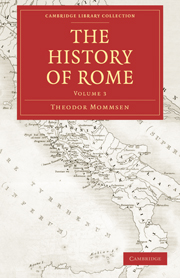Book contents
- Frontmatter
- PREFATORY NOTE
- Contents
- BOOK FOURTH: THE REVOLUTION
- CHAPTER I THE SUBJECT COUNTRIES DOWN TO THE TIMES OF THE GRACCHI
- CHAPTER II THE REFORM MOVEMENT AND TIBERIUS GRACCHUS
- CHAPTER III THE REVOLUTION AND GAIUS GRACCHUS
- CHAPTER IV THE RULE OF THE RESTORATION
- CHAPTER V THE PEOPLES OF THE NORTH
- CHAPTER VI THE ATTEMPT OF MARIUS AT REVOLUTION AND THE ATTEMPT OF DRUSUS AT REFORM
- CHAPTER VII THE REVOLT OF THE ITALIANS AND THE SULPICIAN REVOLUTION
- CHAPTER VIII THE EAST AND KING MITHRADATES
- CHAPTER IX CINNA AND SULLA
- CHAPTER X THE SULLAN CONSTITUTION
- CHAPTER XI THE COMMONWEALTH AND ITS ECONOMY
- CHAPTER XII NATIONALITY, RELIGION, AND EDUCATION
- CHAPTER XIII LITERATURE AND ART
- CORRECTIONS
CHAPTER III - THE REVOLUTION AND GAIUS GRACCHUS
Published online by Cambridge University Press: 05 October 2010
- Frontmatter
- PREFATORY NOTE
- Contents
- BOOK FOURTH: THE REVOLUTION
- CHAPTER I THE SUBJECT COUNTRIES DOWN TO THE TIMES OF THE GRACCHI
- CHAPTER II THE REFORM MOVEMENT AND TIBERIUS GRACCHUS
- CHAPTER III THE REVOLUTION AND GAIUS GRACCHUS
- CHAPTER IV THE RULE OF THE RESTORATION
- CHAPTER V THE PEOPLES OF THE NORTH
- CHAPTER VI THE ATTEMPT OF MARIUS AT REVOLUTION AND THE ATTEMPT OF DRUSUS AT REFORM
- CHAPTER VII THE REVOLT OF THE ITALIANS AND THE SULPICIAN REVOLUTION
- CHAPTER VIII THE EAST AND KING MITHRADATES
- CHAPTER IX CINNA AND SULLA
- CHAPTER X THE SULLAN CONSTITUTION
- CHAPTER XI THE COMMONWEALTH AND ITS ECONOMY
- CHAPTER XII NATIONALITY, RELIGION, AND EDUCATION
- CHAPTER XIII LITERATURE AND ART
- CORRECTIONS
Summary
The commission for distributing the domains
Tiberius Gracchus was dead; but his two works, the distribution of land and the revolution, survived their author. In presence of the starving agricultural proletariate the senate might venture on a murder, but it could not avail itself of that murder to annul the Sempronian agrarian law; the law itself had been far more strengthened than shaken by the frantic outbreak of party fury. The party of the aristocracy friendly towards reform, which openly favoured the distribution of the domains—headed by Quintus Metellus, just about this time (623) censor, and Publius Scævola -in concert with the party of Scipio Æmilianus, which was at least not disinclined to reform, gained the upper hand for the time being even in the senate; and a decree of the senate expressly directed the triumvirs to begin their labours. According to the Sempronian law these were to be nominated annually by the community, and this was probably done; but from the nature of their task it was natural that the election should fall again and again on the same men, and new elections in the proper sense occurred only when a place became vacant through death.
- Type
- Chapter
- Information
- The History of Rome , pp. 101 - 130Publisher: Cambridge University PressPrint publication year: 2010First published in: 1863

